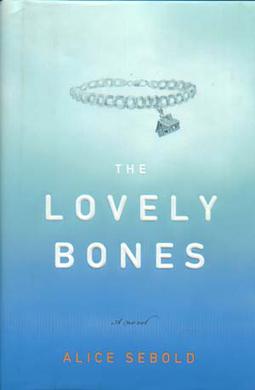
Alice Sebold, The Lovely Bones
I looked into reading this book during my 100-books-pledge but chose not to read it because I didn’t enjoy the excerpt. The reason was that the tone was harsh and unpolished, in the matter-of-fact manner of overly confident fourteen-year-olds and I didn’t think that I would enjoy another book told in the unreliable, emotional voice of an immature teenager so I didn't force it. But this book has become omnipresent, peeking its head out of lists of recommended books and glaring at me from obvious places in bookstores and I decided to give it a second chance. To my surprise and relief, death seems to have brought to Susie, the protagonist and narrator, a mask of calm and lyricism as the rest of the book is a sophisticated, well-written telling of a story and, in the end, lovely.
There were some parts of the novel that I thought did not bear thought very well; they fell apart and seemed senseless when I dwelt on them. Some things involving Ruth, a girl whom Susie’s spirit touched and became subsequently obsessed with Susie and death, and the storyline with Susie’s mother comes to mind. Susie’s mother decided to free herself of the responsibility of her crumbling family in the aftermath of Susie’s murder by leaving and wandering around distant places, doing odd jobs. I questioned her departure as weakly motivated but then thought more about it. Amongst other signs of unhappiness, Susie notes that her mother’s books changed from books on mythology, James, Dickens and Eliot (serious literature etc company) to gardening and cookbooks. Since we are what we read, is there something inherently tragic in this progression of reading habits of housewives?
I browse through discount books at the university regularly. Though I sometimes chance upon ratty old copies of literary novels which I then buy, repair and add lovingly to my library (examples include Winesburg, Ohio, #62 of my 100-books-pledge), most of the books are treatises on abstruse topics that have been discarded by the library for newer editions or newer books. Once, I found a book called Ariel’s Gift, which I recognized to be related to Sylvia Plath from its title. Not being a literature major, I found the analysis of letters of Ted Hughes on Ariel deeply boring (the letters themselves might have been exciting, but the in-depth analysis was quite irksome) but, flipping to the middle, I found pictures of Sylvia Plath, for which I decided to part with 50 cents and buy the book.
In high school, I read her poems in alphabetical and not chronological order, without knowing much of her life and I formed the idea that she was a dark little person, very much like Sebold’s Ruth here in The Lovely Bones, a sort of stereotype high school outcast; smart, awkward, brooding and darkly talented. It was not until I read The Bell Jar (#36 of my 100-books-pledge) that I also read a biography of Sylvia Plath and discovered that she, like Esther Greenwood, was a model student, athletic, kept an elaborate journal and worked as a glamorous intern at Mademoiselle. The photos of Sylvia Plath in that book were of a happy young woman, whom one would never suspect of deep bouts of depression and suicide. There were pictures of her with Ted Hughes, the handsome literary couple in their apartment where they wrote of the backs of each other’s manuscripts, young Sylvia Plath modeling sundresses in a university newspaper and, finally, Sylvia Plath with child, holding another small child, on a lawn in front of a little house. I can see her going inside that cottage-like house to a stack of gardening and cookbooks on the coffee table, where James, Dickens and Eliot rightfully belong, and finding herself trapped under another bell jar, struggling for air.
So ... even though I sort of see the suffocation of domestication for housewives who have been superbly educated, I still feel the departure of the mother to be contrived and weakly motivated.
I also wonder about the character of Susie. Being dead at fourteen but conscious in some version of heaven is like being stuck at fourteen. Which ought to be hell. At fourteen, Susie hadn’t decided who she was and was a girl still undergoing changes. Being dead arrested her development. But from afar, she still clung onto the things that were important to her at the time of her death; a high school sweetheart, her family and exposing her murderer to justice. These are the things that dead Susie can focus on as the book progresses. Close to what can be termed the climax of the novel, through the divine intervention of Ruth and interaction with the living world, Susie begins to let go and beings to change, despite being dead. It makes it seem as if interaction with the living world is the only catalyst for change. Watching, or reading for that matter, is not the same as living and is somehow unable to exact change in Susie. Is it really so? Hmm.
